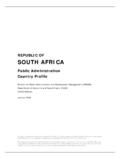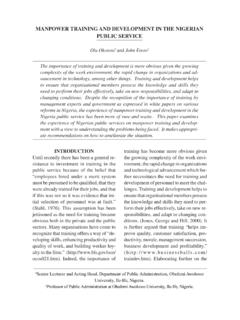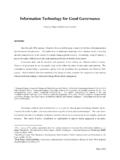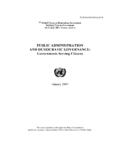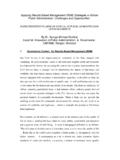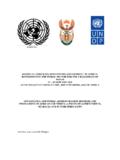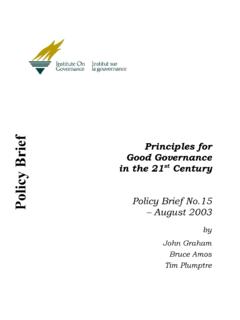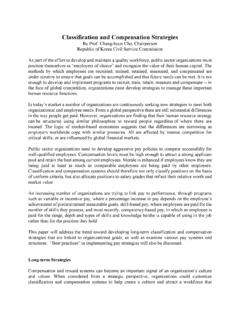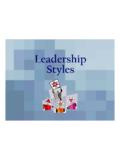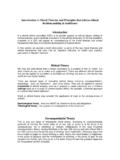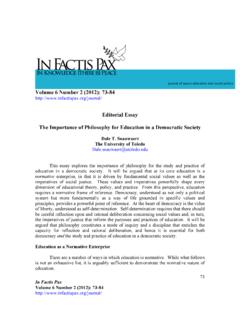Transcription of Dealing with Ethical Dilemmas in Public Administration
1 Dealing with Ethical Dilemmas in Public Administration : the 'ALIR' imperatives of Ethical reasoning By : Anthony Makrydemetres 2002. Contents Table 1. 3. 2. The rise of Ethical reasoning about morals .. 3. 3. Dealing with Ethical Dilemmas in Public Administration .. 5. 4. The ingredients of ALIR .. 6. 5. The imperative for accountability .. 7. 6. The imperative for legality .. 8. 7. The imperative for integrity .. 9. 8. The imperative for responsiveness .. 10. 9. 12. 2. 1. Introduction The new century seems to dawn with a renewed load of Ethical and philosophical Dilemmas which leave practitioners and academics of Public Administration alike in a predicament. Whereas at the beginning of the 20th century there seemed to be only answers and convictions, at the beginning of the new century we are surrounded by new questions, uncertainties and doubts resulting from the overarching processes of the globalization of market economies and information technology as well as the localization of political conflict, authority systems and culture.
2 The phenomenon termed the institutionalization of doubt (Giddens, 1990) is then of wider significance. Naturally, these features of modernity are not unique to civil society; they also affect the civil service and Public Administration in its various manifestations at both the national and international level. Administrative systems in western societies as well as emergent administrative cultures in developing countries often experience and are confronted with a number of opposing values and Ethical Dilemmas concerning the shape, conduct and orientation of Public services. As a result, the burden of conflicting values and divergent responsibilities leave the contemporary administrator in an Ethical quandary and in a state of personal anxiety or angst.
3 However, it is not hard to realize that to overcome such a state of systemic doubt is not simply a matter of personal integrity and professional qualification. Equally significant and even harder to sustain is a threshold of institutional awareness of and receptivity to these emerging demands, as well as an increased capacity to respond adequately to and effectively deal with these challenges. 2. The rise of Ethical reasoning about morals In the history of philosophy, ethics was not among the earliest issues to be examined in a systematic manner, rather it was among the latest. A similar trend can be observed in the history of administrative thought about moral standards in governance and Administration . Whereas in philosophy concern about nature physics - preceded concern about the inner world, in the evolution of administrative thinking attention gradually shifted from the purely structural and functional aspects of organization and management to questions about leadership and motivation initially and then to the proper conduct on the grounds of certain Ethical and normative standards.
4 If ethics came after physics in philosophy, in administrative and organizational analysis Ethical questions arose in the aftermath of earlier concerns about the specification of legitimate conduct on the basis of so called 'external' determinants. The focus of Ethical analysis has shifted to aspects of value and normative dimensions of conduct; and how and to what extent they are internalized and respected by the individual civil servant in Public institutions. It is worth noting that the decisive moment that marked the transition from physics to ethics in philosophy is related to Socrates - who is regarded as the founder of moral philosophy - since ethics and concern with the inner - and not the outer - world became his chief object of thought and inquiry in the fifth century BC (Rowe, 1976; Snell, 1984).
5 Socrates viewed ethics as the rational way that a thoughtful man could follow in order to achieve morality, which was, in turn, defined as the actual choice of the good - 'well doing' - after deliberation. In particular, Socrates related morality with knowledge; that is the knowledge of what is really, and not simply phenomenally, good and useful to man. The rational foundation of ethics consisted in searching for and reasoning about virtue. It is in this sense that 'virtue is knowledge' and unless wo/man 3. has or acquires knowledge s/he cannot be virtuous. Even more, it is only by these means, namely, reasoning about morality, that real and lasting happiness can be brought about. Evidently, the predominance of virtue in the Socratic discourse is predicated on the concept that only conscious and purposive action can be judged and evaluated from an Ethical point of view and on the basis of moral standards.
6 Indeed, Socrates advanced a unified and comprehensive idea about morality and happiness arguing that ethics is about the knowledge of the good things in life (Viastos, 1991). Moreover, Socrates may be credited with the contribution that he 'democratized' Ethical theory in the sense that he made it available and accessible to the people at large. He did that with his dear and powerful method of discursive analysis - as Plato's famous Dialogues disclose - by means of which he was able to test people's views through constant questioning, hence discovering the true nature of virtue. He was persuaded that this type of discursive self-examination makes people better because it entails continual questioning of themselves and others about what to do and what to avoid doing on the grounds of Ethical and moral standards.
7 Both Plato (Socrates' chief disciple) and Aristotle (Plato's successor) regarded ethics as part of politics, the main function of which was to provide the conditions under which the members of the human community, the Polity, would be able to achieve lasting happiness. Thus, knowledge and the approximation of real happiness becomes the essence of the science of the good, which is ethics. It may also be pointed out that ethics for ancient Greeks referred not only to theoretical discussion about the topic, but essentially the actual practice of it; not simply to question and ponder what is good but even more significantly to become good. Indeed, the notion of science - 'episteme' - was inclusive not only of the abstract knowledge of a certain field of thought and expertise, but also of its artful application in life.
8 As a result, a strong normative element permeated the whole scientific endeavour in the sense that values and normative standards ought to guide action and be translated into actual conduct. That, however, presents a major problem since the implementation gap is always there, yawning and inhibiting the transformation of value into action, the congruence of ultimate ends with concrete deeds.'. Yet that is what puts the moral integrity and responsibility of the doer to a decisive test: the courage and determination to live up to his/her proclaimed standards and values. Socrates himself demonstrated with his own personal example the essence of Ethical responsibility when he said in his Apology: You are wrong if you think that anyone who has value would count the danger of life or death or anything else, instead of aiming in his action only this: whether his action is just or unjust and whether it befits a good or a bad man's action.
9 (28 B, 5-9). In conclusion, for ancient Greek philosophers ethics consisted of knowledge and choice of the good things in life - and Administration , to no lesser an extent one might add. Moreover, discourse about values that ought to guide conduct was considered as a value in itself that would bring about virtue and happiness if sought after in a persistent and systematic way. Thus, according to Aristotle, ethos is 'the habit of the good' and ethics is about choice, the choice of the good, which is then habituated in actual conduct.' A further implication of that is ethics cannot be conceived of as a matter of punishment and rewards, but rather as a matter of voluntary choice of the good, which is then consistently exhibited in one's conduct.
10 4. Not surprisingly, therefore, the prime criterion and objective of good governance was, for Aristotle, to accustom citizens (and civil servants, one may add) to the practice of virtue. This is confirmed .. by what happens in states; for legislators make the citizens good by forming habits in them, and this is the wish of every legislator, and those who do not effect it miss their mark, and it is in this that a good polity differs from a bad one.'. The central function of the statesman is then to provide for the moral education of citizens. In order to do that s/he will require knowledge, knowledge of virtue, and that kind of knowledge is acquired through constant search and questioning about things and action. Indeed, morality in essence consists in continually questioning it.
